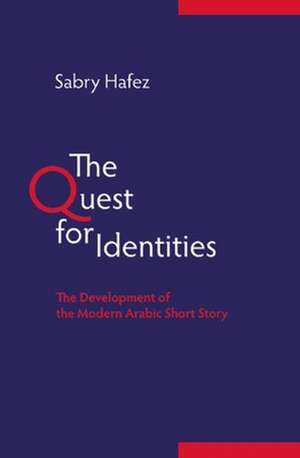The Quest for Identities: The Development of the Modern Arabic Short Story
Autor Sabry Hafezen Limba Engleză Hardback – 30 iun 2008
This long-awaited sequel to the classic Genesis of Arabic Narrative Discourse investigates a number of crucial questions related to the genre’s development. For example, can the study of this genre provide us with wider insights into the culture as a whole? And how have writers in one Arab country influenced those in others?
These are just some of the issues addressed through close reading of authors such as Yusuf Idris, ‘Abd al-Rahman al-Sharqawi, and Edwar al-Kharrat, among others.
Sabry Hafez is a professor of modern Arabic and comparative literature at the School of Oriental and African Studies, University of London.
These are just some of the issues addressed through close reading of authors such as Yusuf Idris, ‘Abd al-Rahman al-Sharqawi, and Edwar al-Kharrat, among others.
Sabry Hafez is a professor of modern Arabic and comparative literature at the School of Oriental and African Studies, University of London.
Preț: 279.68 lei
Nou
Puncte Express: 420
Preț estimativ în valută:
53.52€ • 56.13$ • 44.55£
53.52€ • 56.13$ • 44.55£
Carte indisponibilă temporar
Doresc să fiu notificat când acest titlu va fi disponibil:
Se trimite...
Preluare comenzi: 021 569.72.76
Specificații
ISBN-13: 9780863563638
ISBN-10: 0863563635
Pagini: 446
Dimensiuni: 164 x 236 x 32 mm
Greutate: 0.89 kg
Editura: SAQI BOOKS
Colecția Saqi Books
Locul publicării:United Kingdom
ISBN-10: 0863563635
Pagini: 446
Dimensiuni: 164 x 236 x 32 mm
Greutate: 0.89 kg
Editura: SAQI BOOKS
Colecția Saqi Books
Locul publicării:United Kingdom
Notă biografică
Sabry Hafez is Professor of Modern Arabic and Comparative Literature at the School of Oriental and African Studies, University of London. He is one of the leading writers and critics in the Arab world and publishes extensively, in Arabic and English, on modern Arabic literature, drama and cinema.
Descriere
A fascinating study of a popular and vital genre often overlooked by literary critics.
